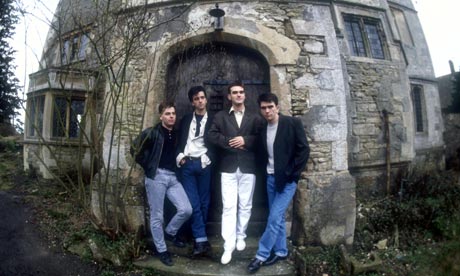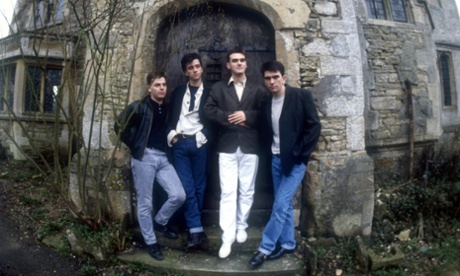The Smiths existed for only five years, between 1982 and 1987, and so appealed to those born in the late 60s and early 70s. That was their soundtrack, and now they are turning 40, they are revisiting their youth. But what's interesting about the Smiths is how they have crossed the generational divide to appeal to current, real-time teenagers.
Much of this has to do with the quality of the music. The eight albums remastered by guitarist Johnny Marr and reissued by Rhino last week display an extraordinary diversity of melody and mood – an outpouring of well over 70 songs. The rhythm section is strong: occasionally stolid, always solid and sometimes – in particular on their career highpoint, the extraordinary "damn you, England" rant called "The Queen is Dead" – totally inspired.
At the centre you have the partnership of Morrissey and Marr. Right from the off, Morrissey displayed an almost supernatural ability to tap into the teenage psyche: not the fizzy surface of marketing and mainstream pop culture, but the muck and dirt. His witty, allusive lyrics – sometimes literary, sometimes extremely blunt – deep-mined the less palatable sides of adolescence.
It's all there: sexual and social confusion, vulnerability and violence, alienation and loneliness, the oscillation between feeling abject and worthless and wanting to take over the world, the fantasies of power and revenge. Morrissey did not just write from within: the almost forgotten "Girl Afraid" is a closely observed masterpiece of stunted teenage courtship.
These emotional states – not often explored with such precision in popular music – were uplifted and dramatised by Marr's abilities as a guitarist, songwriter, arranger and producer. Morrissey's sometimes awkward persona and scansion were transformed into concise, exciting, memorably melodic, and above all graceful songs that have stood the test of time.
The cliched view of the Smiths – assisted by Morrissey's own self-mockery and, later, mannerisms – was that they were miserable and wimpy. Not so. The music is always tough, as is the attitude: the Smiths were all from the northwest, when that wasn't fashionable. They had that particular Mancunian quality – the ability to self-start – as well as a fierce regional pride.
In the 1980s, they offered a real alternative to the mainstream pop and indeed politics of the time. Their songs ranged from the almost unbearably poignant ("Hand in Glove") to the frankly vulnerable ("How Soon is Now"). They were humorous, bitter and spoke about situations and feelings that were rooted in everyday experience but nevertheless rarely the subject of pop songs.
When you're young, you can feel as though you're the only person in the world. If somebody affects you in a positive way, by giving you hope and, further, an idea of how you could live your life, then that's a very powerful bond. The Smiths were outsiders and made music for people like themselves: the fact that they remain popular and relevant shows that, for all the jibes, they made great art. John Savage
'We were all cycling, listening to the Smiths'
Ruth Martin: lecturer, Manchester
"They really spoke to me," says Ruth Martin, remembering the first time she heard the Smiths, their songs copied from a cassette lent to her by a friend from her technical drawing class at school. She was 15 years old, nuts about music and given to listening to the John Peel show under the bedcovers at home in Guildford.
Now a 42-year-old lecturer in film and music at Trafford College, Manchester, she is a regular at the Morrissey Smiths Disco at the Star and Garter pub and, thanks to listening to Meat is Murder, a committed vegetarian. But organising a Smiths-themed bike ride, a 16-mile loop that took in landmarks immortalised in Morrissey's lyrics, is the most unusual thing she has ever done through her love of the band.
A news story about criminals stealing lead from the roof of Salford Lads Club, which featured in a photograph taken by Stephen Wright on the inside cover of The Queen is Dead album, sparked a desire to do something to help.
"That struck a chord because Morrissey sang about people lifting the lead off Holy Lane church in the song 'Vicar in a Tutu'. So I just had a crazy idea, to raise money for Salford Lads Club by holding an event for Smiths fans," she says.
On 30 September 2006, 62 passionate fans got on their bikes and recreated the music video from 1987's "Stop Me If You Think You've Heard This One Before", in which Morrissey cycles round the city.
They stopped at such hallowed landmarks as Morrissey's childhood home in Stretford, Southern Cemetery and HM Prison Manchester, and ended up raising £4,000. London-based tribute act the Smyths played to welcome cyclists back to the Lads Club.
"People remember it with great fondness because it was a very successful day," she says. "We had a guy with an MP3 player plugged into an enormous boombox on a bicycle trailer; we had people who couldn't ride bicycles and people who hadn't ridden bicycles since they were teenagers. We had a girl from Italy who borrowed a bike off one of the workers at Salford Lads Club; we had a crazy girl from America, which is always good for a laugh. You felt quite powerful, riding en masse, listening to the Smiths' music." Gemma Kappala-Ramsamy
'Our pilgrimage was really embarrassing, but it had to be done'
Liz Tray and Leah Kardos: proofreader, London, and musician/lecturer, Bedford
In December 2006, the day after seeing Morrissey in concert at Manchester Central, best friends Leah Kardos and Liz Tray went to a Manchester tattoo parlour to immortalise their love of the singer and his former band. Then, with Morrissey lyrics freshly inked on the underside of an arm (Leah) and back (Liz), they drove to Salford and posed, as thousands of Smiths fans had done before them, in front of the Salford Lads Club, a place of pilgrimage since the band were photographed there for The Queen is Dead in 1986. "It was really embarrassing but it had to be done," laughs Kardos.
Kardos, 32, moved to England from Australia in 2004 and met Tray through a Bowie fansite. Despite being from Manchester, Tray, 34, had never been a big Smiths fan, but Kardos took her to a Morrissey concert and she was hooked. Although they don't see eye to eye in the Smiths v Morrissey debate (Kardos goes for the band, Tray favours Morrissey's solo work), they agree on the quality of the lyrics throughout. For Kardos, they "could have been a print-out of my internal monologue" at certain points in her life.
The decision to get a tattoo was Kardos's idea. But which lyrics to choose from so many classic lines? Kardos opted for "Don't forget the songs that made you cry/ And the songs that saved your life", from "Rubber Ring" by the Smiths, to remind her "of the art that matters to me and the music that's underscored my life".
Tray found it a little harder to decide. Then she recalled listening to Morrissey's "Speedway" on a long drive to a job interview in California and it seemed appropriate. Now, "In my own sick way/ I'll always stay true to you" can be read on her back. "It's about being true to yourself and being loyal and honest," she says.
Kardos describes her relationship with the Smiths as familial: "You go through it all together and you're stuck with each other." Now, for both friends, this is especially true. Rosanna Boscawen
'You don't have to be a recluse to enjoy them'
Thomas Howarth: student, Derby
"There's this perception that you've got to be furiously depressed and lonely to listen to the Smiths," says Thomas Howarth, 18, from Derby. "But it's about the music, really. Take the song 'I Want the One I Can't Have' – you don't have to want the one you can't have to enjoy it. It's like saying you can't enjoy NWA without hating the police or Jay-Z without being a targeted black man in New York."
Howarth, who has just begun the first year of his English and philosophy degree at Nottingham University, discovered the Smiths two years ago. It was Valentine's day and he was watching the NME channel with his girlfriend when the video for "There is a Light That Never Goes Out" came on.
"I was intrigued by the video's pretentious imagery – Oscar Wilde on a wall, bicycles with baskets and NHS glasses." Morrissey's style also caught his eye, as Howarth also wore his hair in a quiff, inspired by David Tennant's Doctor Who, and liked flowery shirts. It was enough to prompt some research into the band and before long Johnny Marr's guitar work and Morrissey's vocals had him hooked.
"The 80s were crammed with simple pop tunes and cliched lyrics and the Smiths stood out," he argues. "You've just got to compare Morrissey's lyrics with Wham!'s lyrics. And as fun and as camp as Frankie Goes to Hollywood were, they never took flowers on to Top of the Pops. Duran Duran never etched their LPs with literary references. You don't have to be a moping recluse to enjoy that the Smiths did that."
Howarth reckons that it's their lyrics that have won the Smiths younger fans who, like him, weren't even born when they began making music.
"Even Morrissey's solo output has not been as eloquent or interesting as the Smiths, lyrically, and I think there are very few bands that live up to what the Smiths were saying."
But discovering that the general perception of Smiths fans is that they agree with everything Morrissey says baffles him.
"Finding out about Morrissey, and how controversial he is, just makes me understand less why people think you have to be a Morrissey loyalist to enjoy the Smiths. I rarely agree with the things Morrissey says in interviews but I still enjoy his musical output.
"I think it's important to appreciate the Smiths in a bit of a tongue-in-cheek way as well. To acknowledge that it must have seemed pretentious to enjoy 'This Charming Man' when Duran Duran was playing on the radio. There is more to them than other bands, but essentially, it's just a band, isn't it?" GKR
'I heard them at the age when you don't know who you are'
Shaun Duggan: writer, Liverpool
"It wouldn't be an exaggeration to say he changed my life," Shaun Duggan says of Morrissey. Growing up on the Norris Green council estate in Liverpool, Duggan, who is now 41, was bullied at home and at school – "I was probably just a bit too sensitive and effeminate for my own good" – and he found solace in the Smiths, particularly in their first couple of albums, when he was 14 or 15. "It just got me at the right time really, when you're at that age when you don't know who or what you are."
Duggan had always wanted to be a writer and within a year of his first encounter with the Smiths he had written a play called William, after "William It Was Really Nothing". In 1986, when he was 16, it won a competition at the Royal Court's Young Writers' festival and was staged at the theatre theatre. The play's success, which Duggan saw as "the only possible escape route", led to introductions to Morrissey and the band and ultimately to friendship. The first time they met was at London's Brixton Academy in 1986, at what was to be the Smiths' last live performance. "I remember at one point being the only person in the whole auditorium with the Smiths live on stage running through their songs. It was very surreal."
The play wasn't all good news: when it was performed, the bullying escalated and bricks were thrown through Duggan's window. He was placed under police protection. Throughout, Morrissey would write him letters, encouraging him in his writing. "I remember one in particular where he said, 'As they're hammering nails into your kidneys, you hereby earn your qualifications to write.'"
Now Duggan writes mainly for television: his credits include Brookside (for which Morrissey shared his enthusiasm, even making a cameo in the spin-off Brookside South mini-series) and EastEnders, and he is working with Jimmy McGovern on an episode of Accused for the BBC. He grows gladioli in his garden as a tribute to the band that has had so much impact on his life. RB
'You don't often find people you can talk about Morrissey with'
David and Julie Pyne: a manager at a glass manufacturer, and an adminstrator at DHL, Wakefield
"The love of the Smiths' music and Morrissey changed our lives," says David Pyne, 45, a manager at a glass manufacturing company. His wife, Julie, a 50-year-old administrator at DHL, agrees. And why wouldn't she? After all, it was their shared passion for the Mancunian band's oeuvre that brought them together.
The pair met by chance after attending a Morrissey gig at Leeds town hall on 20 April 2006. David got talking to Julie's brother, Glen, at the merchandise stand and they decided to go for a drink at a nearby music bar.
"We were chatting for about an hour and I said, 'Time to get off now.' Then Julie uttered those immortal words, 'You can have my number if you want.'"
"We'd got music as common ground, and you don't often find people you can talk about Morrissey with," says Julie.
They went out for two years. David proposed while they were on a visit to Keswick in the Lake District, and in 2009 they returned there for their Smiths-and-Morrissey-themed wedding. All the men in attendance wore purple gladioli in the pockets, a huge picture of Oscar Wilde presided over the ceremony, and before Julie entered the room in her cream wedding dress, the intro music Morrissey uses for his live shows whetted the appetite of the guests.
"We got our wedding rings engraved with the words 'Now My Heart is Full', the name of a song from Morrissey's Vauxhall and I album," says Julie, and it was that song that soundtracked their exit from the register office.
The Pynes now live in Wakefield, in a cottage packed with photos of Morrissey and a dedicated music room stuffed with CDs and vinyl. They still marvel at their good fortune.
"If we hadn't have both been at the merchandise stand at that time…" says David. "Five minutes either way and we never would have met." GKR












